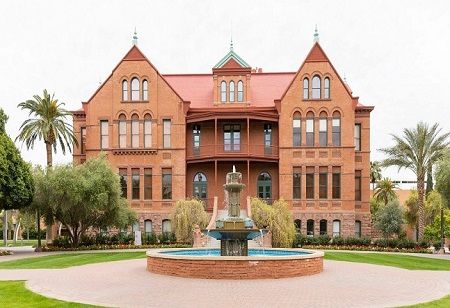In a significant development this year, the U.S.–Japan strategic partnership achieved a major milestone with both countries pledging enhanced cooperation in artificial intelligence during Japanese Prime Minister Fumio Kishida’s landmark state visit to the U.S. As part of this commitment, Arizona State University is spearheading initiatives to deepen the understanding of AI's impact both domestically and internationally.
This summer, 12 undergraduate and graduate students from the College of Global Futures and the Thunderbird School of Global Management took part in the inaugural Japan–U.S. Global Leadership Program in the Age of Artificial Intelligence in Japan. This international educational initiative is hosted by Hiroshima University in collaboration with three U.S. institutions: Arizona State University, the University of Texas at Austin, and Purdue University.
“The partnership with Hiroshima University brought together U.S., Japanese and international students to analyze artificial intelligence and its uses to benefit societies”, said Mary Jane Parmentier, a clinical professor and deputy director of the School for the Future of Innovation in Society, an academic unit of the College of Global Futures, who led the student experience in Japan this summer.
The academic program, supported by Japan’s Ministry of Education, Culture, Sports, Science and Technology (MEXT) through its five-year Inter-University Exchange Projects, is designed to promote international cooperation in AI education. It featured a range of activities, including lectures, workshops, company visits, field trips to local attractions, and cultural experiences in Hiroshima.
“We are thrilled to provide our ASU students with this invaluable opportunity to cultivate a global mindset while connecting cutting-edge innovation with meaningful societal impact”, said Eusebio Scornavacca, director of the School for the Future of Innovation in Society and professor with the Thunderbird School of Global Management.
Throughout the program, students and faculty from the participating universities collaborated to integrate AI into various sectors, including agriculture, healthcare, community service, and government policies, with an emphasis on addressing Japan's societal needs.
The program highlighted the dual aspects of technological progress and its significant effects on humanity. While it concentrated on future-oriented technological innovations, students also explored historical and peacebuilding topics, coinciding with the 79th anniversary of the Hiroshima and Nagasaki bombings. As part of the program, students visited the Atomic Bomb Dome and participated in the annual Hiroshima Peace Memorial Ceremony.
“It was highly significant to have the workshop on this emerging technology, with its potential for good and harm, in the city of Hiroshima, which bore the tragic results of a technological development used for warfare”, said Parmentier.
The program aims to develop globally adept leaders with advanced skills in AI and data literacy. These future leaders will play a key role in guiding international discussions on the responsible use of AI, ensuring that society can maximize its benefits while mitigating its risks, according to Kaneko.
According to Scornavacca, the summer program is a component of the extensive and ongoing partnership between ASU and Hiroshima University. This collaboration highlights ASU’s dedication to innovation, global leadership, and preparing graduates with the knowledge and skills necessary to thrive in an increasingly AI-driven world.

